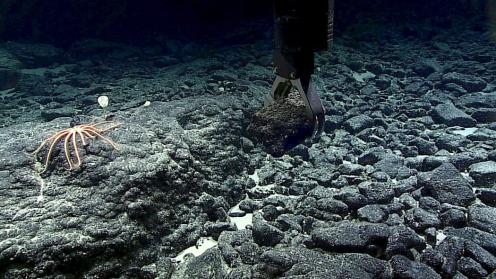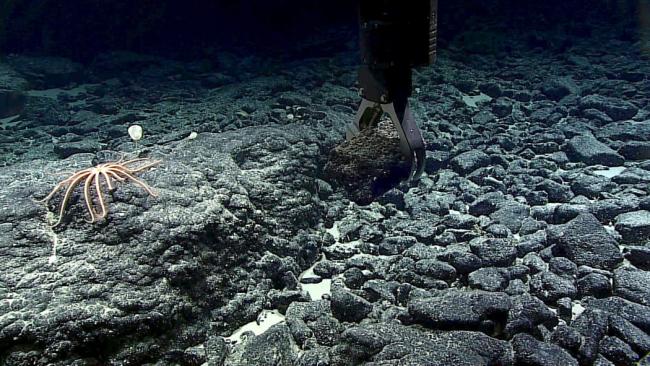About
Delegates continued work on the development of exploitation regulations for seabed mining, following a roadmap adopted in July 2023. However, regulating commercial exploitation of deep-sea minerals is no easy task, and there is no real indicator of progress for assessing if the roadmap is in line with reality or wishful thinking.
Final report
Summary report 30 October – 8 November 2023
All coverage
The passionate debate over deep-sea mining has intensified over the last few years and the work of the International Seabed Authority (ISA) is attracting increasing interest by policymakers, the environmental community, deep-sea mining companies, the media, and the public. ISA members have expressed polarized opinions on the prospect of commercial deep-sea mining, with more than 20 countries supporting a moratorium or precautionary pause and others ready to sponsor commercial activities.
The arguments over the commercial exploitation of mineral resources from the deep-sea are not new. Those in favor of mining point towards a sustainable supply of nickel, manganese, cobalt, and copper, stressing that these minerals are necessary for a worldwide energy transition and sustainable development, while also pointing towards unsustainable practices in land mining. Those opposed to mining focus on the need to protect the ocean, which is already facing numerous challenges including pollution, biodiversity loss, and climate change, and to study these little-known deep-sea ecosystems, prior to authorizing any extractive activities.
ISA, as the body responsible for organizing, regulating, and controlling all mineral-related activities in the Area (the Area’ (the seabed, ocean floor, and subsoil beyond the limits of national jurisdiction) for the benefit of humankind as a whole, has been trying to balance these concerns through the development of the “Mining Code,” which is the set of rules, regulations, and procedures to regulate prospecting, exploration, and exploitation of minerals in the seabed in areas beyond national jurisdiction. Following the issuance of regulations on Prospecting and Exploration, the development of regulations for the exploitation of mineral resources is currently under negotiation.
Negotiations heated up recently due to the “two-year rule,” which refers to a provision in the 1994 Agreement relating to the implementation of the UN Convention on the Law of the Sea (UNCLOS) Part XI (the Area). The provision notes that if the ISA Council has not completed the elaboration of the regulations relating to exploitation within two years following the request of a state who intends to apply for approval of an exploitation plan, then the Council “shall nonetheless consider and provisionally approve such plan of work” based on the provisions of the Convention and any rules that the Council may have adopted provisionally. On 25 June 2021, Nauru submitted such a request, in connection with its contractor Nauru Ocean Resources, Inc. Several delegates have expressed concerns over potential provisional approval of a plan of work for exploitation without the necessary holistic regulatory framework in place.
During the second part of the 28th session (10-21 July 2023), the ISA Council adopted two decisions relevant to the two-year rule and to the timeline for the development of the regulations following the expiration of the two-year period. The decision on the two-year rule notes that if an application for a plan of work is submitted before the Council has completed the exploitation regulations, the Council shall address this as a matter of priority, including the possible issuance of guidelines or directives, prior to the Legal and Technical Commission finalizing its review of the plan of work.
In the decision on the timeline, the Council expresses its intention to continue the elaboration of the exploitation regulations with a view to their adoption during the 30th ISA session in 2025. It further decides that if the exploitation regulations are not completed by the end of the July 2024 meeting, the Council will assess remaining work and consider another roadmap to that end.
The ISA Council consists of 36 ISA members. The ISA Council convened for its third and last meeting of the 28th ISA annual session from 30 October to 8 November at ISA headquarters, in Kingston, Jamaica.
The Earth Negotiations Bulletin writers for this meeting were Asterios Tsioumanis, Ph.D. and María Ovalle. The Digital Editor was Diego Noguera. The Editor was Pam Chasek, Ph.D.
View past and future events
Past event
23rd Annual Session of the International Seabed Authority
Past event
1st Part of the 24th Session of the International Seabed Authority
Past event
2nd Part of the 24th Session of the International Seabed Authority
Past event
1st Part of the 25th Annual Session of the International Seabed Authority (ISA)
Past event
2nd Part of the 25th Annual Session of the International Seabed Authority (ISA)
Past event
1st Part of the 26th Annual Session of the International Seabed Authority (ISA)
Past event
27th Session of the Assembly of the International Seabed Authority (ISA-27)
Past event
1st Part of the 28th Annual Session of the International Seabed Authority (ISA)
Past event
2nd Part of the 28th Annual Session of the International Seabed Authority
Past event
3rd Part of the 28th Annual Session of the International Seabed Authority
Past event
1st Part of the 29th Annual Session of the International Seabed Authority
Past event
2nd Part of the 29th Annual Session of the International Seabed Authority
To receive free coverage of global environmental events delivered to your inbox, subscribe to the ENB Update newsletter.

